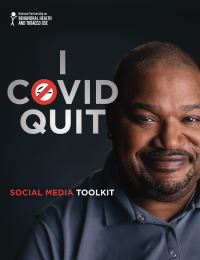Do the COVID QUIT!
There's never been a better time to quit smoking. During the COVID-19 pandemic, we saw just how vulnerable our bodies can be, and doesn't it make sense to do everything we can to prevent disease from exploiting our weaknesses? Smoking creates lung damage which makes it hard to recover when/if you are infected with the COVID-19 virus. Smoking also weakens your immune system. In fact, smoking damages nearly every organ in the body. The good news is, now there are more resources than ever to help people quit!
Get inspired and tell us how YOU COVID quit below!
FAQ
Research is still inconclusive regarding whether a smoker's respiratory tract is more likely to "grab" the virus. But since smoking can make the infection become more serious, it is prudent to stop now.
Yes. There are many studies that show that smokers who get sick with COVID-19 can become more seriously ill and have worse outcomes. Smokers with COVID-19 are more likely to go to the ICU, need a ventilator to help them breathe, and are more likely to die. Smoking increases the duration and severity of other viral infections as well.
Because COVID-19 affects the lungs and smokers' lungs are weaker than those of non-smokers. Smoking damages the tiny hair-like cilia of the lungs, making them less able to sweep away dirt and mucous. When the cilia can't clean the lungs completely, the lungs are less able to fight infections. Smoking also weakens the immune system, creating more likelihood of getting sick and staying sick longer.
The lungs begin working better within the first few weeks of quitting smoking, the risk of heart attack goes down and the immune system begins to heal, improving the ability to fight other infections. The benefits of quitting smoking are numerous and begin almost immediately - within 20 minutes - of the last cigarette.
Not at this time, but several studies are trying to explore this issue. Until we know more, it is prudent to assume there is no protective effect.
COVID-19 is most likely transmitted through close contact with a person while they are infectious or 24 hours before their symptoms appeared, or close contact with a person with a confirmed infection who coughs or sneezes. Coughing is a risk factor for the spread of COVID-19. The irritation caused in the airways by inhaling tobacco means that people who smoke tend to cough more frequently than non-smokers. Read more here: https://www.cdc.gov/coronavirus/2019-ncov/transmission/index.html
Though it feels like a relief for a short time, the body actually goes through withdrawal, physically and mentally, between cigarettes because it's addicted. Quitting smoking will actually lower one's overall stress after about 1-3 weeks with effects similar to an anti-depressant. Yet another benefit to quitting! Read more here: https://www.bmj.com/content/348/bmj.g1151
Yes! After 8 hours of not smoking, oxygen levels begin to return to normal levels. This helps tissues and blood vessels get more oxygen, making it easier to breathe.
Calling 1-800-QUIT-NOW is a great first step! It's important to have support. When you call, you can talk to a counselor as much or as little as you'd like. They can help you create a quit plan and even refer you to a healthcare provider who can help with other resources such as prescription medications and/or over-the-counter nicotine replacement therapy.
Great question! Quitting smoking actually improves someone's chances of long-term sobriety by 25%! Through the California Behavioral Health and Wellness Initiative, we at the SCLC have provided technical support and guided many programs through their process of becoming tobacco-free. In the interest of improving a person's overall wellness, encouraging tobacco-free recovery provides more and longer-lasting benefits to your clients. Contact us at (877) 509-3786 for more information, resources and support!
Resources
For Individuals
SmokefreeTXT: A mobile text messaging service designed for adults and young adults across the United States who are trying to quit smoking.
Quitlines: If you want to talk to a quit smoking counselor right away, call 1–800–QUIT–NOW (1–800–784–8669). This page from the CDC has videos that show what you can expect when you call 1-800-QUIT-NOW and how you can get the most out of their experience. When you call 1-800-QUIT-NOW, you can speak confidentially with a highly trained quit coach. Quitlines provide many of the services and similar support found in a stop-smoking class or from a doctor, and can be a valuable complement to a doctor’s care. Quitlines are available throughout the United States. Coaching help is available in several languages. View the CDC’s Five Reasons Why Calling a Quitline Can Be Key to Your Success.
Quit Smoking Apps: Mobile phone applications can help you prepare to quit, provide support, and track your progress.
Support Groups: Visit your county or state government’s website to see if they offer quit smoking programs in your area. In California, visit Kick It California
Friends and Family: Getting support from the important people in your life can make a big difference during your quit.
Medications: Doctors can prescribe medicine that may help you quit. There are also over-the-counter products available. If you are using one of these, such as the patch, gum, or lozenges, make sure you have them on hand. Speak to your doctor about the possibility of combining these options to help control your cravings.
For Providers
Order Quitcards: There are over 4 million QUIT NOW cards in circulation and all types of health professionals and counselors, and peers currently use the approach and the card to help smokers quit. Submit this form and someone will contact you to complete your order. Please allow 4–6 weeks for shipping from our vendor A4. 250 card minimum order. Cards are free of charge.
Toolkits and Information: There are several recommended places for healthcare providers to find helpful resources online, including:
- Resources for Health Professionals at Smokefree.gov
- CDC Healthcare Provider Resources
- Smoking Cessation Leadership Center (SCLC)
Webinars: SCLC offers Continuing Education Units for our live webinars and some recorded collections. Find information on our next live webinar here and peruse previous webinars in our archive. To receive information and reminders about upcoming webinars and more tobacco-related news join our listserv
Share
Download our digital ads and videos and consult the toolkit for how best to share this message on your personal or organizational social media account.
Digital Ads & Branded Images
Download and share (right-click and save image files to share)
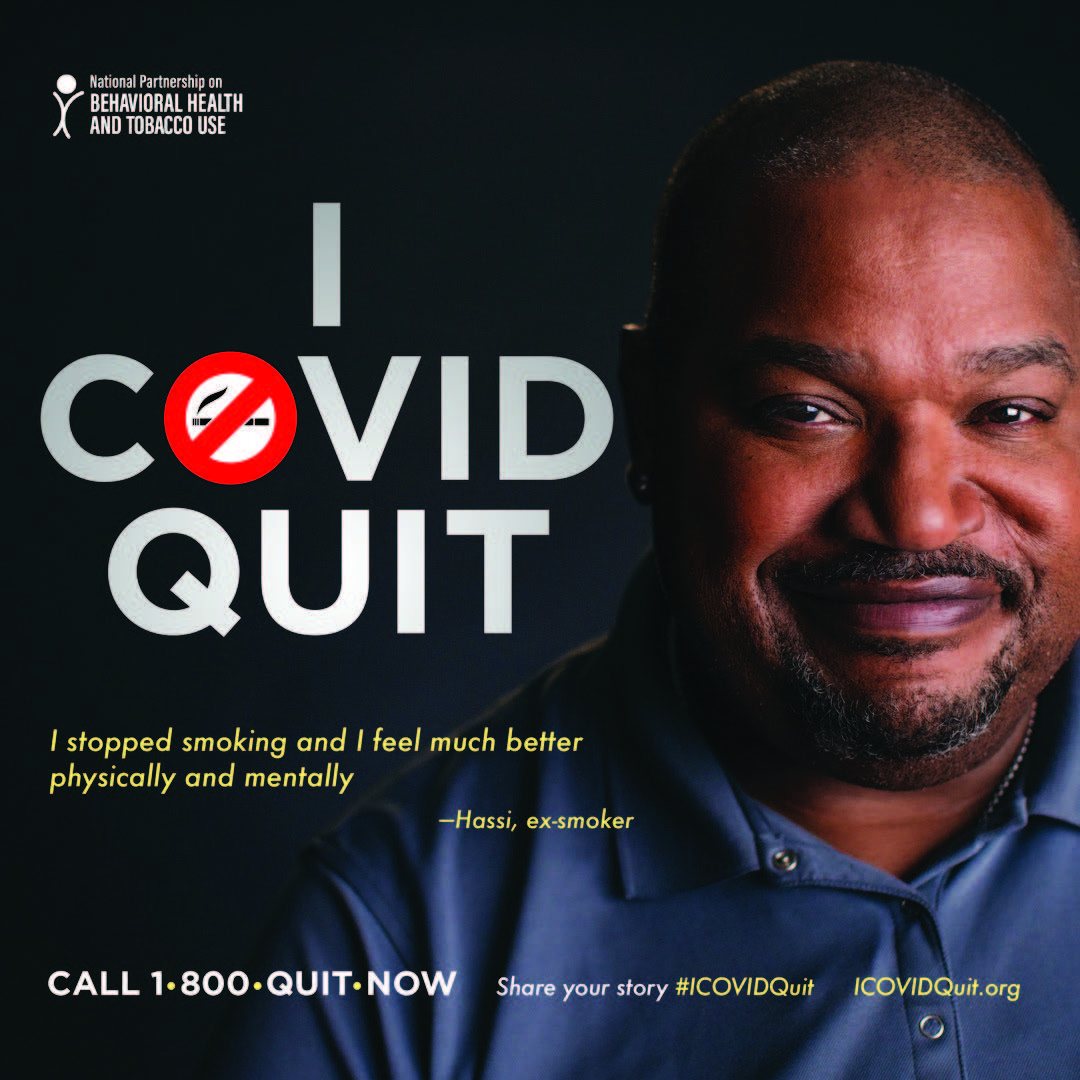

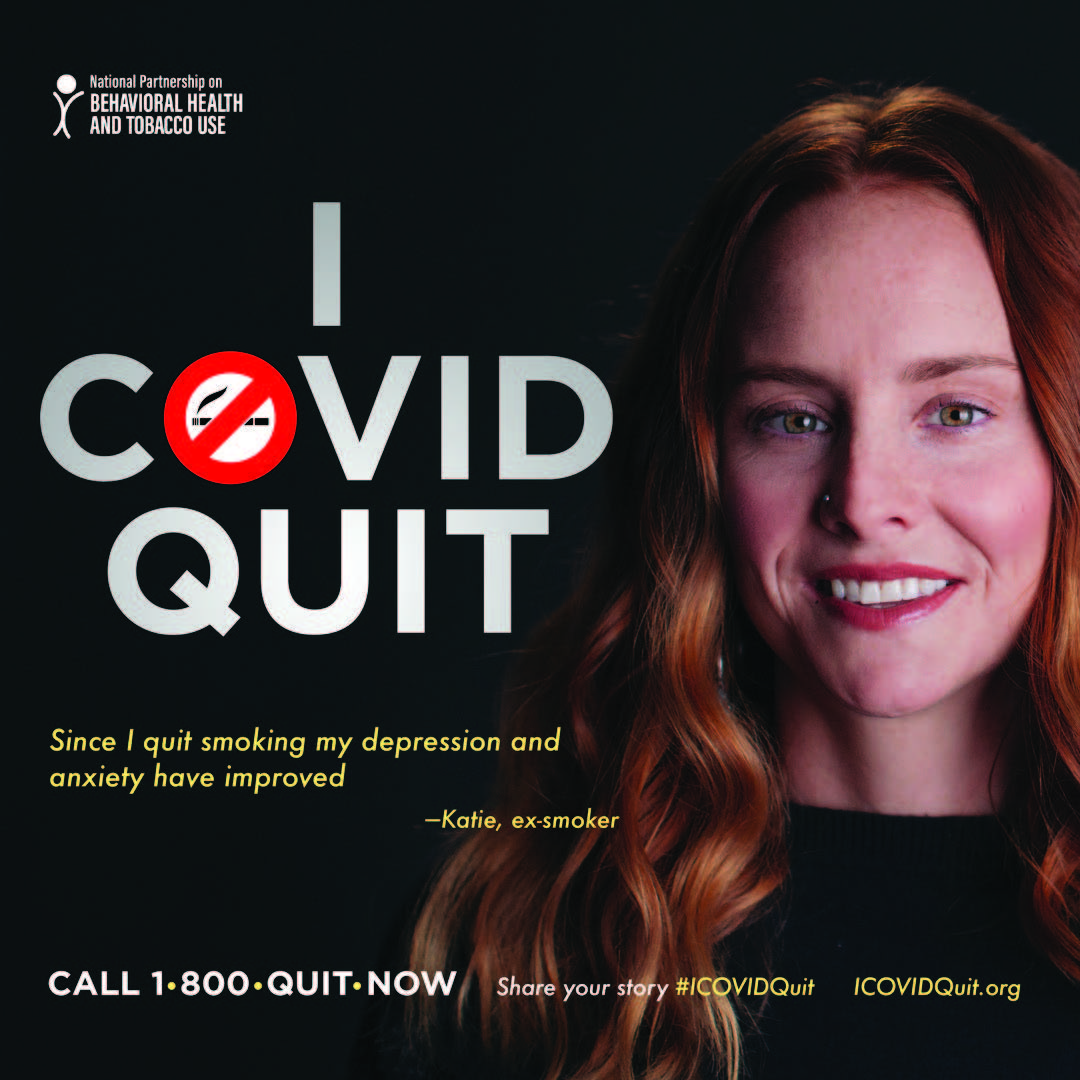

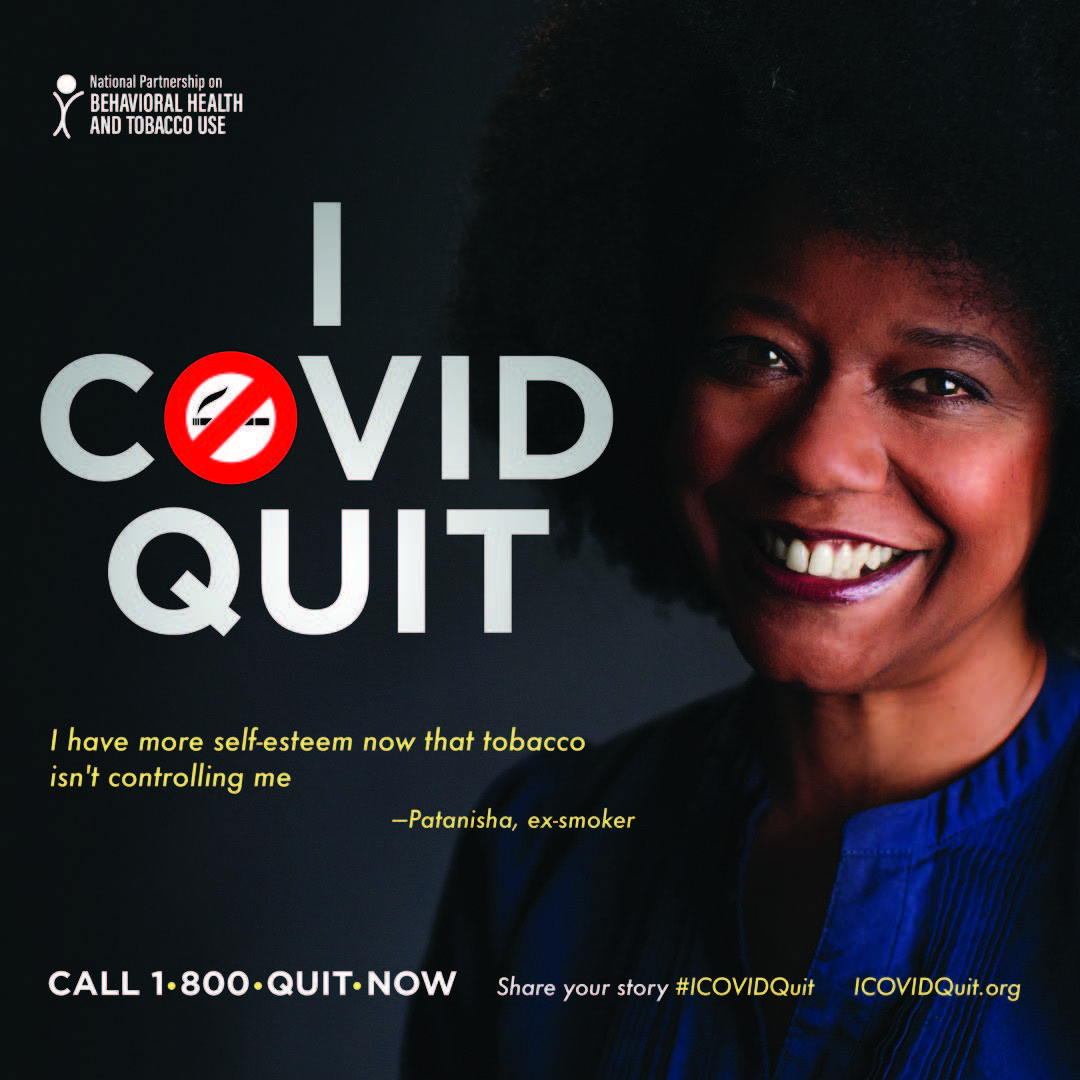

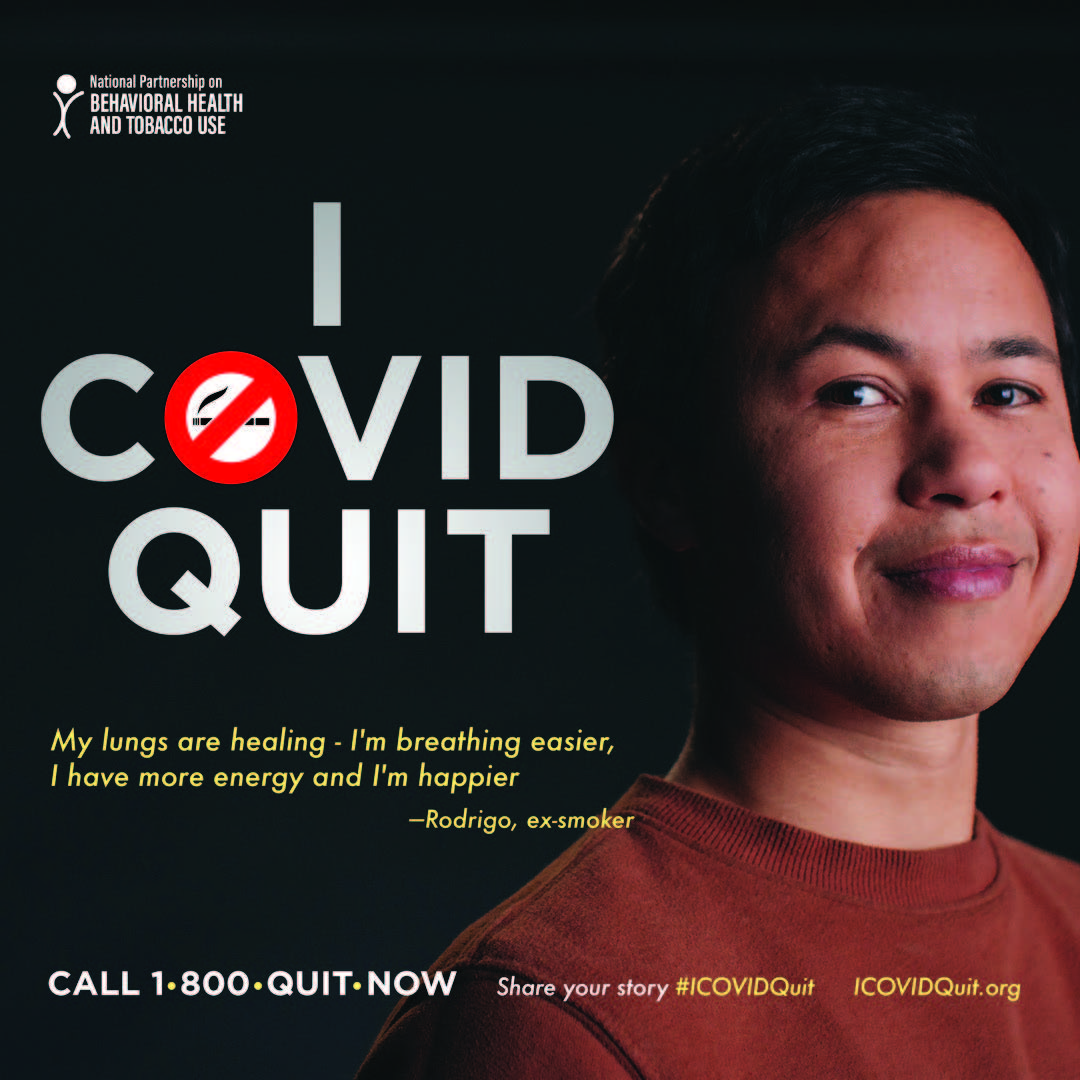

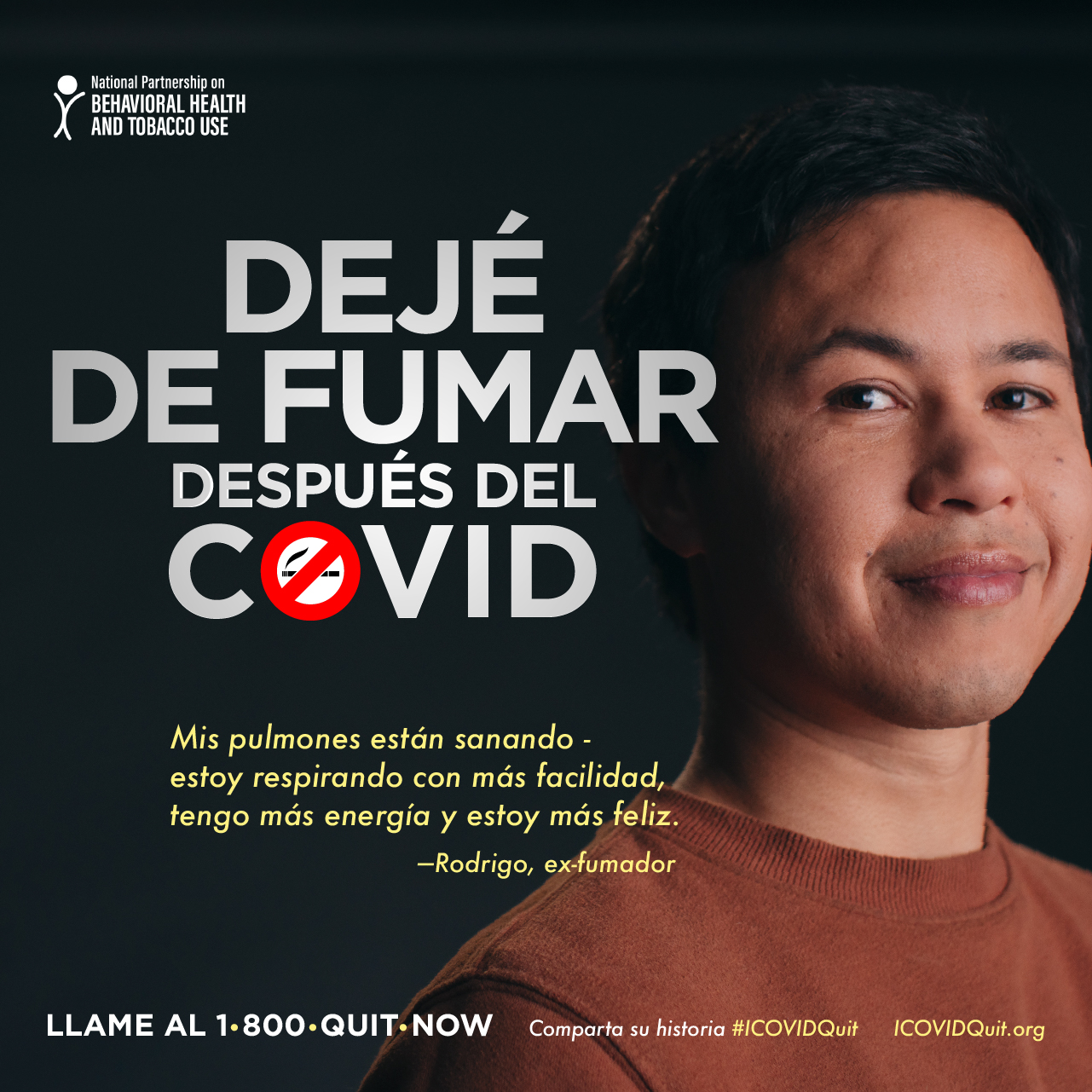

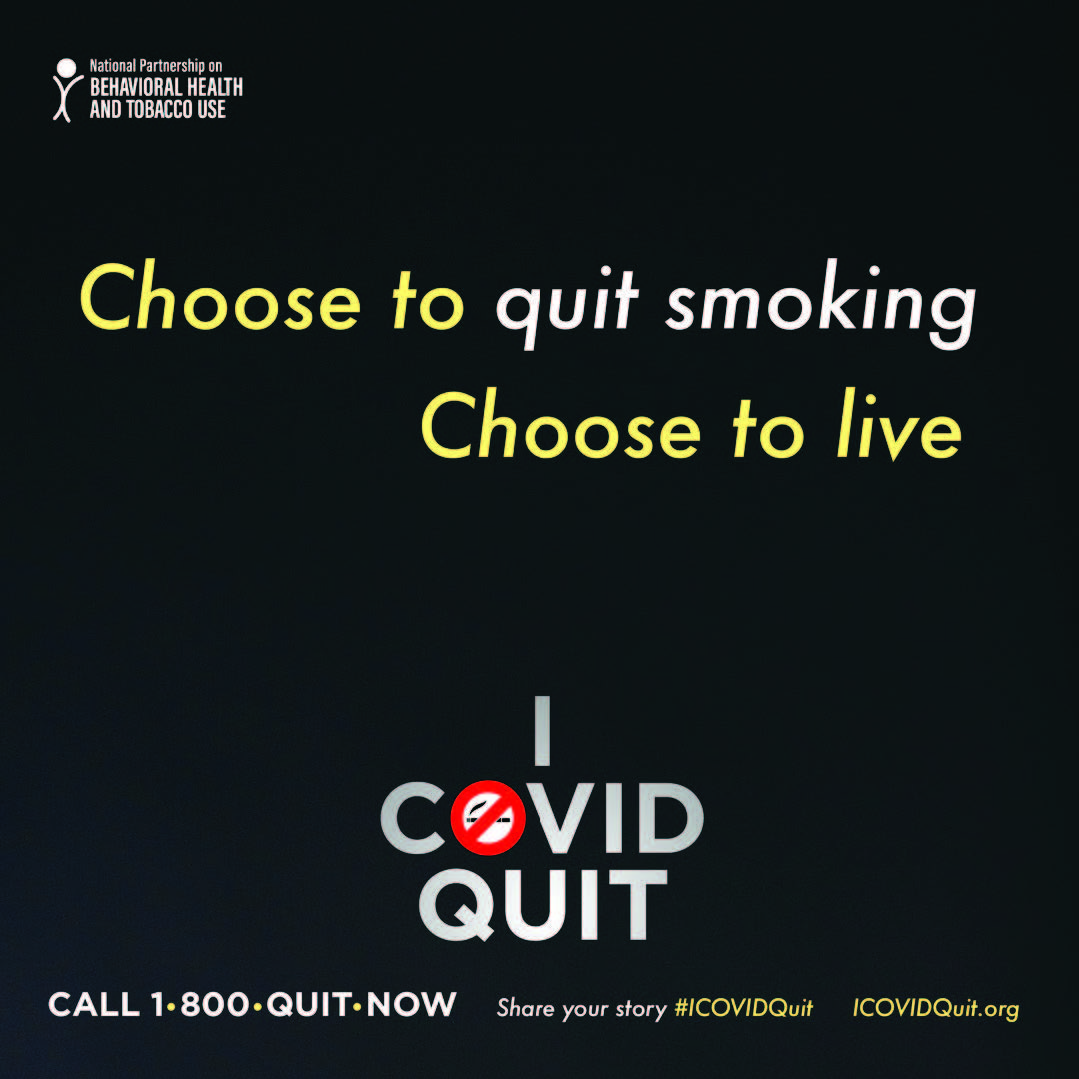
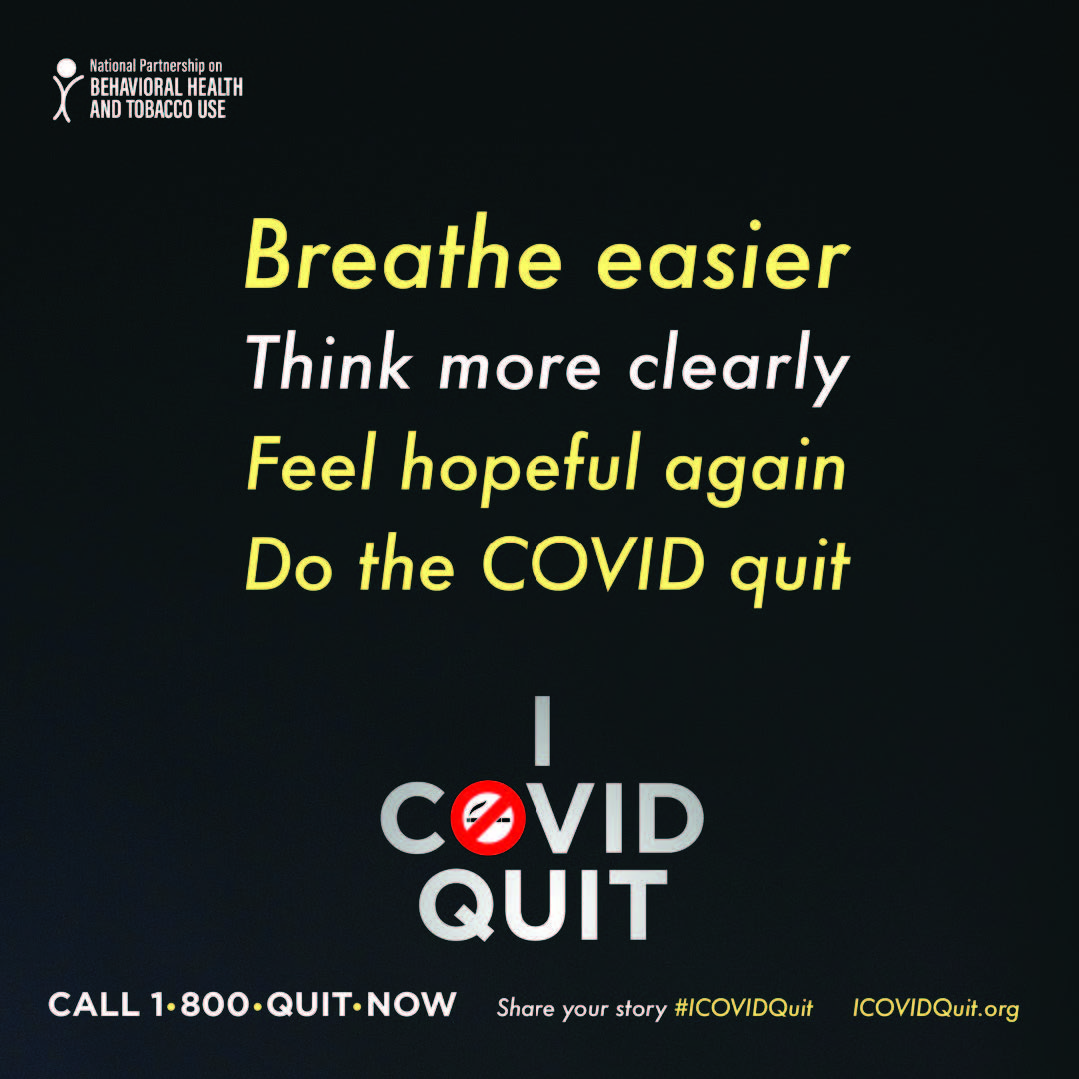
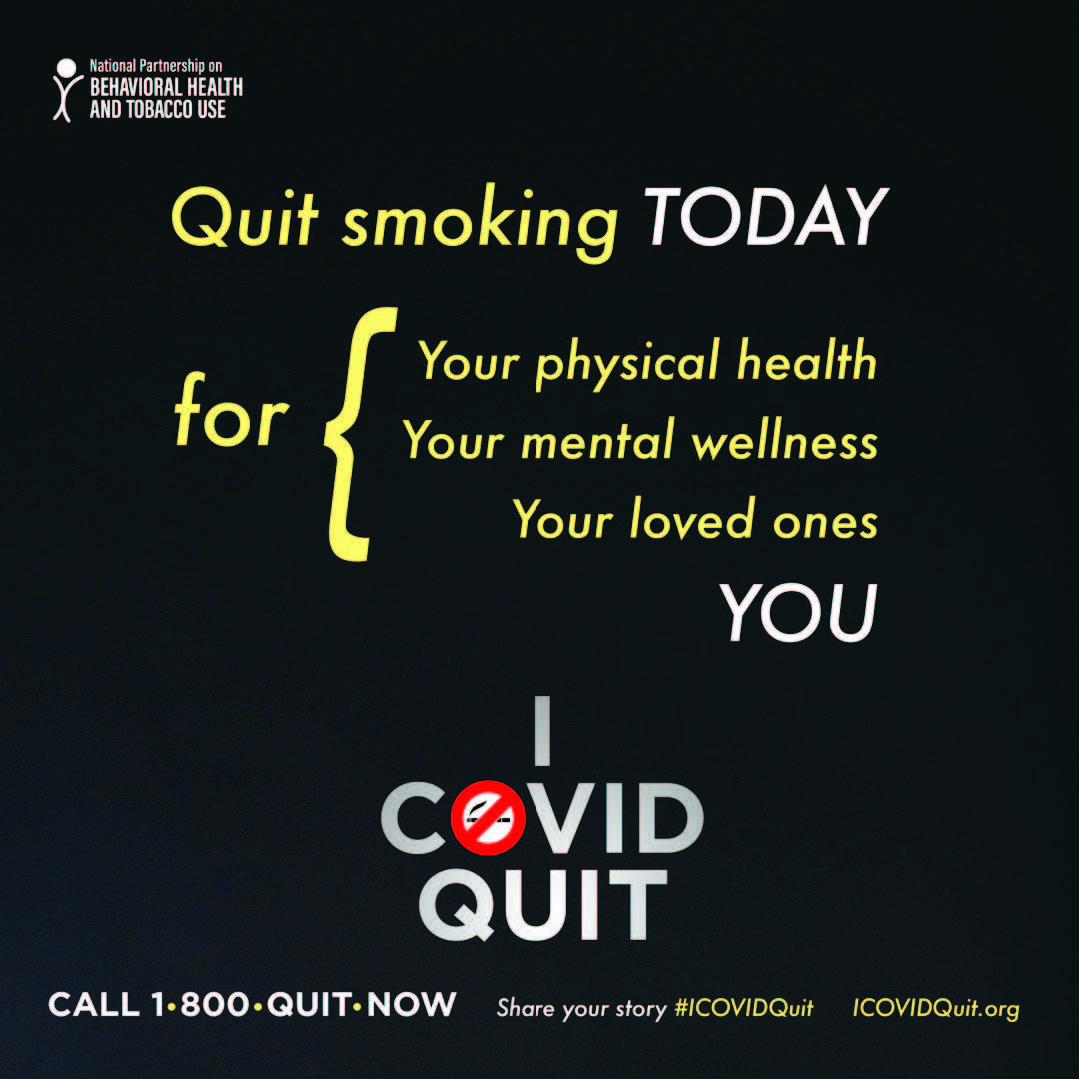
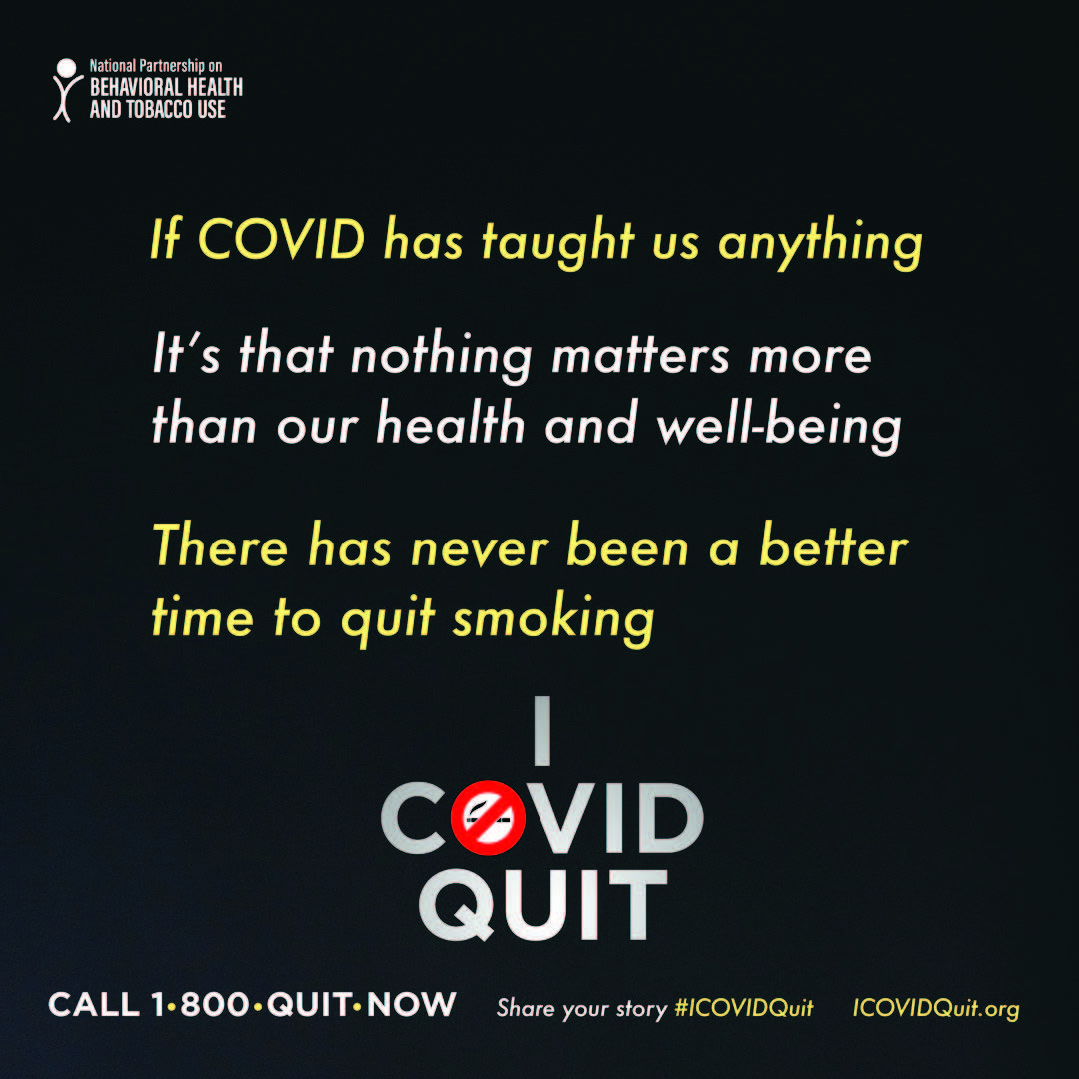
Videos
Tell us how YOU COVID Quit!
Share your story via email or use #ICOVIDQUIT on social media to inspire others.
"I quit smoking 20 days ago. It was my fifth attempt. It feels good to have done something positive for my health. I think I’ve quit for good this time. Wellbutrin helped. Having a dedicated support person helped."
—Amanda C., Michigan
“I never thought I had a problem smoking, but I smoked when I drank beers with my friends after my shift at the restaurant where I worked. I'm trying to start over now, and it feels good to choose the things that are good for me. Even though it’s really hard, and COVID added a lot of stress, I’m always fighting to be healthy.”
—José, New Jersey
"I started at only 12 years old from being peer pressured into it by some bad kids. I smoked half a pack a day for 20 years. When COVID hit, the fear of catching it led me to my decision to quit. While there have been some slip-ups, I'm determined to quit for good."
—Josh, shared on Instagram @tobaccofreerecovery
"I started smoking cigarettes at age 12. I started abusing substances at age 13. I began my recovery from substances July 25, 2014. I quit smoking cigarettes in May of 2017 but began vaping then and continued to vape for 3 years after I quit smoking. When the pandemic began I actually got really sick at the end of March into the beginning of April. My area didn’t have Covid tests to know whether that was what was happening but I thought, 'If this isn’t Covid, I don’t want to know what it is like to vape if I do have it, because this is bad.' So, I ordered nicotine gum online and started using that while vaping here and there and finally quit vaping April 11, 2020."
—Ana Woodburn, Health Educator, Hutchinson, Kansas
—Read Katie's Op-Ed "How the Pandemic Helped Me Quit Smoking," published 5/17/2021 on Changing America

